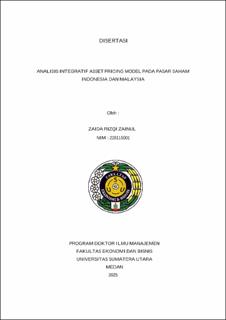Analisis Integratif Asset Pricing Model Pada Pasar Saham Indonesia Dan Malaysia
An Integrative Analysis of Asset Pricing Models in the Indonesian and Malaysian Stock Markets

Date
2025Author
Zainul, Zaida Rizki
Advisor(s)
Fachrudin, Khaira Amalia
Syahyunan
Irawati, Nisrul
Metadata
Show full item recordAbstract
Asset pricing models have been widely applied and tested in developed markets with consistent and reliable results. However, the distinct characteristics of emerging markets such as Indonesia and Malaysia necessitate a redevelopment of traditional asset pricing models. This study aims to integrate a modified Fama Five-Factor model with investor sentiment in the stock markets of Indonesia and Malaysia. The research sample consists of 93 stocks listed on the Indonesia Stock Exchange and 212 stocks on Bursa Malaysia. Analysis was conducted by forming 48 stock portfolios annually from 2013 to 2023 based on the Fama Five-Factor model and sentiment premium in both countries, with a total of 528 observations. Path analysis and moderated regression analysis (MRA) using dummy variables were then performed. The results show that the market risk premium has a positive effect on excess return, size premium, value premium, and profitability premium. Investor sentiment positively influences excess return and size premium but has a negative impact on value premium and investment premium. Certain premiums such as value, profitability, and sentiment are higher in the Indonesian stock market compared to Malaysia, whereas the Malaysian stock market performs better in generating excess return, size premium, and investment premium. Some premiums (size and value) mediate the relationship between market risk premium and investor sentiment on excess return. The profitability premium only mediates the relationship between market risk premium and excess return, while the investment premium mediates the relationship between investor sentiment and excess return. Market sentiment does not significantly affect excess return but moderates the relationship between investor sentiment and excess return in both stock markets. These findings suggest that considering sentiment levels in market stability policies is crucial for investors and investment managers when implementing long-term stock investment analysis strategies in emerging markets such as Indonesia and Malaysia.
